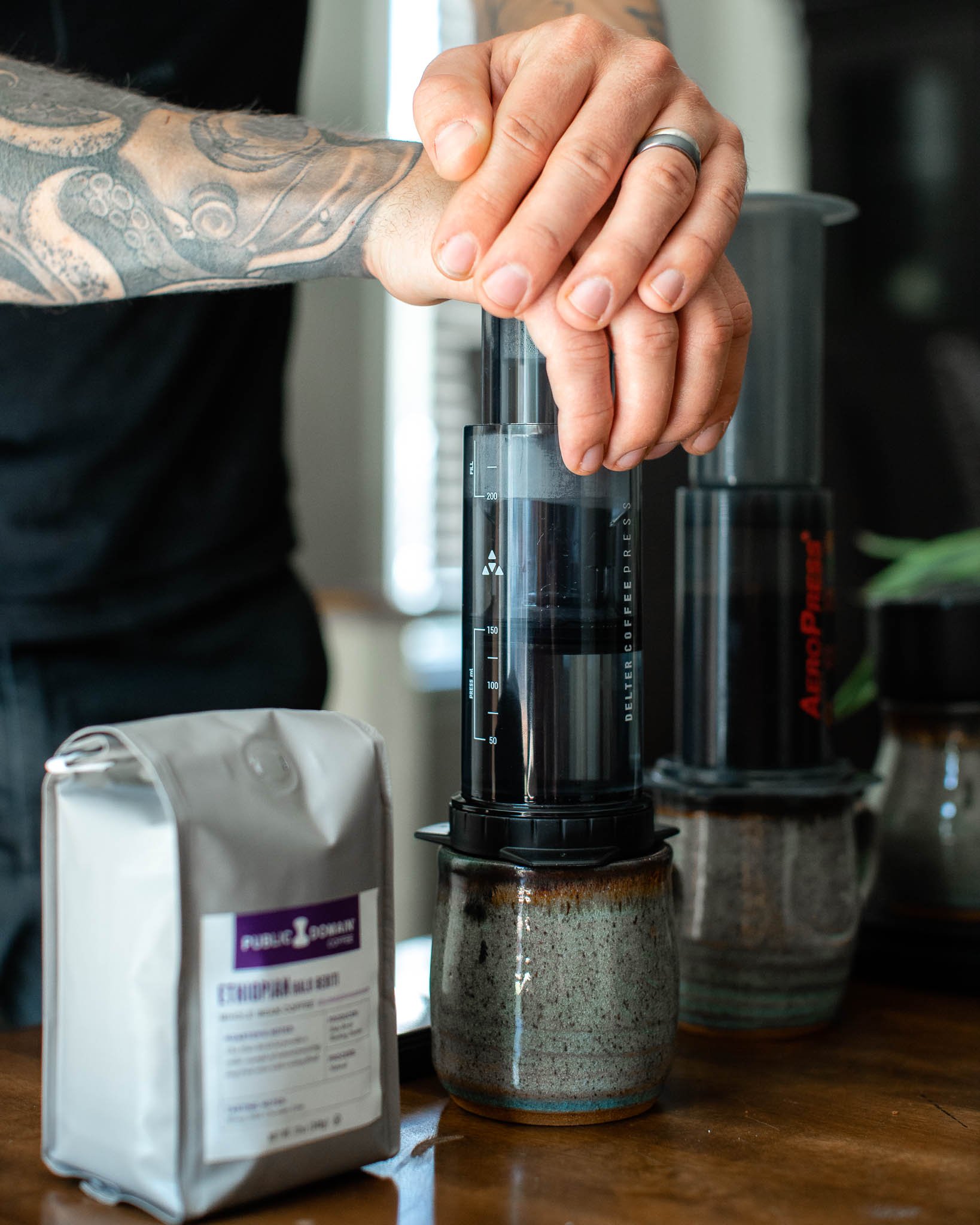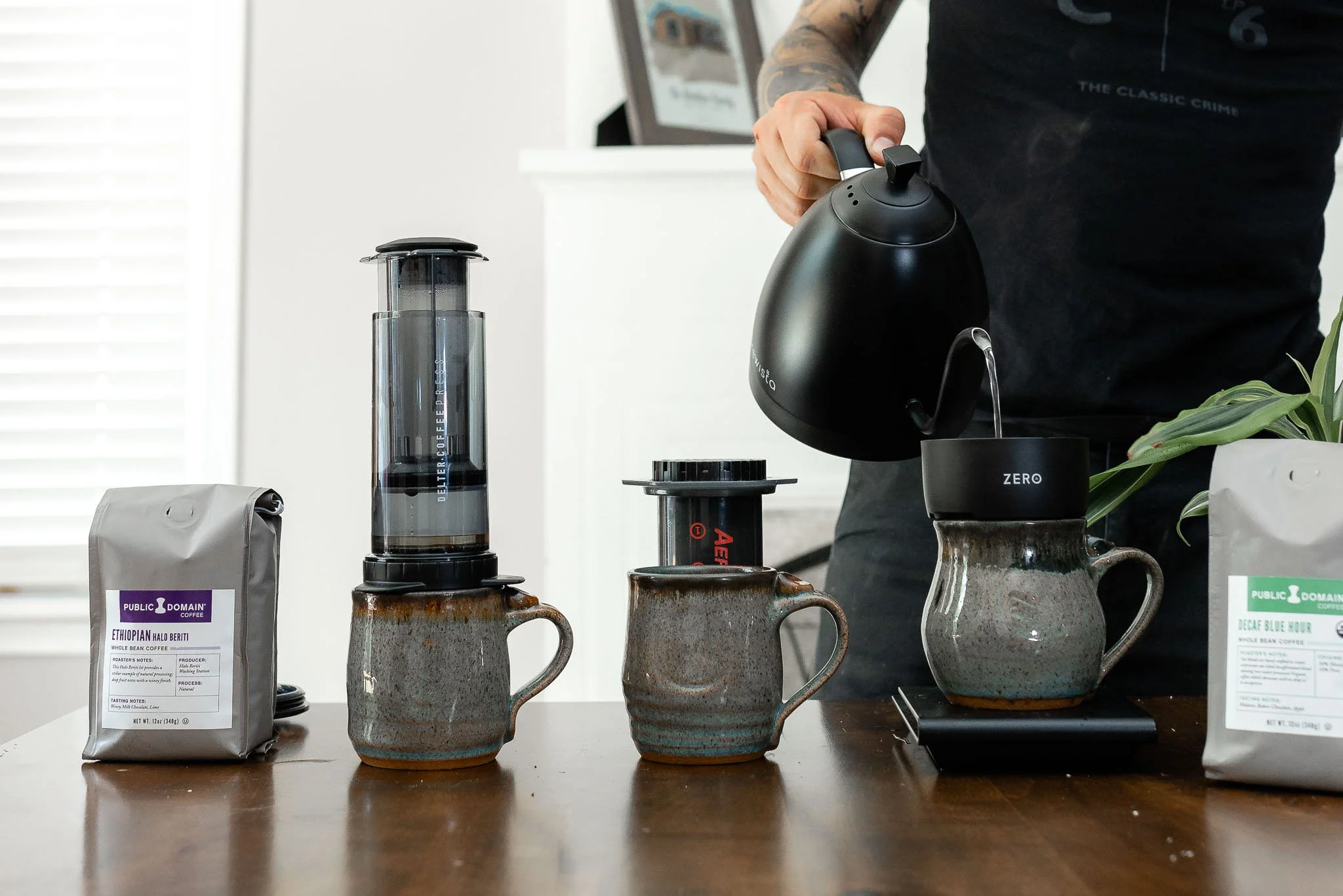Aeropress vs Delter Press vs Trinity Zero: Battle of the Presses Round 2
The coffee brewer space seems to be an ever expanding universe. With each device claiming an ability to re-invent your brewing, it can be hard to figure out which one is worth buying. Over the last year, I got my hands on two brewers aiming to dethrone my personal favorite brewer, the Aeropress. So it's time to revisit the Battle of the Presses! In the ring this time we have the Aeropress vs the Delter Press vs the Trinity Zero Press! Which one deserves a place in your coffee arsenal?
Sponsor Plug: Public Domain Coffee
This post is brought to you thanks to the support of Public Domain Coffee. As a classic procrastinator, nothing motivates me more than a good deadline. I've stewed over this blog post since I first picked up the Trinity Press last year. So when Public Domain asked if they could sponsor a post of my choosing, I saw the perfect opportunity to finally write this piece!
To Public Domain, ethically sourced means taking care of the farmers, respecting the environment, and supporting coffee-growing communities. Discover a rotating seasonal coffees that spark a conversation and elicit curiosity! Thanks Public Domain for your support!
The Competitors
Before we can get to the results, we should take some time to get to know our contenders! While each of these devices utilize a pressing action of some kind, they vary more in their effective methods of extracting coffee.
The Aeropress
Alan Adler began his development of the Aeropress in 2004. He set out to reduce the amount of acidity and bitterness in his daily cup. The Aeropress primarily utilizes immersion brewing, meaning the grounds steep surrounded by water during the brew process. After steeping, the plunger presses the slurry through the filter cap.
The Delter Coffee Press
Born in Australia, the Delter Coffee Press came on the scene in 2018 with the intention of creating the cleanest, fastest brewer on the market. While it may look very similar to the Aeropress, the two brewers use very different extraction methods. The Delter utilizes percolation or injection brewing and more closely resembles that of a pour over. This brewer limits agitation by dividing the grounds and the water by a silicone screen. This screen acts like a dispersion head in a traditional coffee maker to evenly distribute the water over the grounds bed. The action of pressing pushes the water through the screen and onto the coffee.
Trinity Zero
Also of Australian origin, the Trinity Zero comes from the company that brought the Trinity One, the do-it-all manual brewer, to market. Trinity claims the Zero press will brewer a stronger coffee in a shorter amount of time. Aesthetically, this brewer departs from the other two and comes in a much smaller form factor. This smaller size and shape makes it the only pocket brewer in this competition. (Though, I wouldn't want it in my pocket for very long) In terms of brewing mechanics, the Zero utilizes a percolation method like the Delter Coffee Press. The silicone screen in this brewer doesn't completely isolate the grounds from the water. The lid features a pump that pressurizes the water chamber, forcing it out through the coffee basket.
Disclosures
None of the three coffee brewer companies gave me any money to try their products. I received both the Trinity Zero and the Delter Coffee Press as part of separate collaborations with Sttoke. While I've purchased a few Aeropresses over the years, I also own a couple that were gifted to me directly by Aeropress. None of them get to review this content before I publish it.
The "Competition"
I need to start this off by acknowledging some personal bias. If you've followed me on Instagram for any length of time, you know that I'm a huge fan of the Aeropress. I've used the Aeropress for years and know it better than any other brewer on the market. That puts the other two at a distinct disadvantage when I'm deciding my favorite. So I intend instead to help you understand the differences between them and help you figure out which best fits your lifestyle.
Methodology
I'm going to cover the following aspects of each brewer: Brew Method, Brewing Experience, Resulting Brews, Versatility, and Portability.
I spent an exclusive week each with the Trinity Zero and Delter Coffee Press to learn as much as I could. I also did a couple of side-by-side brews using all three brewers. (Tbh, this was mostly for visual content. It's not easy to precisely brew three at a time)
Brew Methods
I used the following brewing method for each of the brewers.
Aeropress Brew Method
Upright
20g
Medium Fine
320g total water
Pour up to the top of the AP or 320g whichever comes first
With a spoon, stir while moving the spoon from the bottom to the top of the slurry once
If needed, top off to 320g
Cap with the plunger
Steep for as long as you can, at least 2 minutes. 4 is ideal.
Swirl AP, then press gently all the way to the bottom
This is my current favorite brew method for the Aeropress.
Delter Press Brew Method
Pulse Press Method
20g
Medium Fine
320g total water
Add 200g of water
Draw up to 50g of water, press slowly and begin timer
Pre-infuse for 30 seconds
Draw up to 150g of water, press slowly to the 100 mark (about 1/3rd of the water) let the bed rest for 15 seconds
Refill with 120g of water
Draw up to the rest of the water
Press about half of the remaining water, rest for 15 seconds
Press remaining water
Drawing inspiration from Alvin Cheng's recipe on Instagram, I ended up liking this recipe the best. I took the same concept behind pulse pour recipes used with pour overs and applied it to the press mechanism.
Trinity Zero Press
Non-Bypass Method
18g
Medium Fine
288g water
Pour 100g
Pre-infuse with the lid off for 30 seconds
Cap with lid then press slowly and hold for a 3 seconds before pressing again
When top chamber is empty, remove lid and add 100g of water. Repeat pressing process
Fill again with 88g, repeat pressing process
The standard recipe for this brewer uses a bypass method to produce a small, strong coffee. You can then cut the coffee to taste with water. This method also worked well for me, though I found I prefer this non-bypass method.
Paper Filters
Both the Trinity Zero and the Delter Coffee Press came with metal filters. Since I'm partial to the cleaner cup paper filters provide, I decided to use an Aeropress paper filter in all of them. The Aeropress filters don't fit perfectly in either of the other brew baskets, but I was able to make them fit in a usable way.
Paper filter in the Delter Coffee Press filter cap
Paper filter in the Trinity Zero coffee basket
Brewing Experience
This is where my bias toward the Aeropress really shows. Thanks to my years of experience using the Aeropress, the whole process feels like home to me.
I found the Delter Press in particular to be confusing at first. More often than not, I would put the grounds in the filter basket, rather than against the silicone screen with the press inverted. My mistake meant the grounds got in the way of the filter cap threads. I had to move the correct spot before I could proceed, and often made a mess in the process. Clearly, this is more user error than a fault of the Delter press. If you are an Aeropress user, make sure you pay close attention to the directions on your first couple of uses. The similarity in shape definitely lured me into a false sense of security.
The Trinity Zero's straightforward, simple design made it very intuitive to use. My biggest struggle was knowing when I had pressed all the water through and knowing how hard to press.
Speed
All three brewers aim to speed up the brewing process while increasing the quality of the resulting coffee. Using the methods above, I didn't find any of the brewers to be faster than the others. Using the Trinity Zero's standard bypass method significantly speeds up the brew time, from around 3 minutes down to roughly 60 seconds.
While the Zero and Delter didn't require any steeping, the pre-infusion step and repeatedly adding more water made up for the Aeropress's steep time. All of the brewers took around 5 minutes to finish a brew.
Clean Up
My experience with cleaning the Aeropress sets the bar pretty high. I find popping the puck of grounds out very satisfying and super easy. With the inclusion of the paper filters, both of the other two were pretty easy to clean. All I really had to do was knock the coffee basket (Zero) or the brewer against the side of the trash can (Delter) to get most of the grounds out. They both required a little extra rinsing to get all the coffee out, but it was a pretty negligible amount.
Resulting Brews
When considering any brewer, this is going to be the major factor to consider. So how do the final cups stack up to each other?
Aeropress
My current brew method results in a clean, vibrant cup of coffee that especially accentuates floral and fruity notes. I typically get a good balance between acidity and sweetness. I found the Aeropress brought a more well-rounded cup, which I assume comes from the extended contact time between the grounds and the water.
Delter Press
I found the Delter Press excels at emphasizing a lighter mouthfeel and erred toward sweetness over acidity. The cups always reminded me of solid pour over. While it lacked a little bit of the well-roundedness I found in the Aeropress, the cups were sweet and pleasant to drink. Really the difference between the two was pretty minimal. I'm not sure I could pick them out in a blind tasting.
Trinity Zero
The Trinity Zero had noticeably weaker notes across the board. I still enjoyed the cups, but they lacked the same sweetness, body, and acidity of the other two. When brewed as intended, the short, strong coffee did exhibit more body, but I still felt it lacked the sweetness of the Delter Press and the balance of the Aeropress.
Versatility
I don't see how the Aeropress could lose in a competition of versatility compared to any brewer. Neither of the other brewers give you as much control over the brewing variables as the Aeropress. In doing so, they likely provide a more easily consistent result. I found the ability to control contact time between the water and the coffee to really give the Aeropress an advantage over the other two.
Size comparison between the Aeropress, Delter Coffee Press, and Trinity Zero
Portability
Much of the marketing around these brewers parrots their supreme portability. Of the three, the Trinity Zero easily outpaced the others as the smallest and easiest to use while on the go. Even the Aeropress's smaller travel version, the Aeropress Go, doesn't pack down as small or as easily as the Trinity Zero. You could easily toss the Trinity Zero in any bag, or even in a pocket (though it wouldn't be the most comfortable fit). As the tallest and the heaviest, the Delter Press came in with a clear disadvantage here.
Results
Which of these brewers you should add to your collection depends larger on what you want to get out of it. All of them made delicious coffee and are easier to use than many other brewers on the market. Each have their own advantages and disadvantages over each other:
The Aeropress
This brewer is the all-around champ. Thanks to it's versatility, relatively high portability and easy brewing experience, I think every coffee kit should include an Aeropress.
Delter Coffee Press
This brewer is a great choice for those looking for an easy way to make a great pour over like cup. Its limitation of variables like agitation make it really easy to use. Plus, I'd dare say it's one of the more aesthetically interesting brewers out there.
Trinity Zero
The Trinity Zero press is for those who want maximum portability and don't mind sacrificing some control over variables to get it.
Public Domain Coffee
Thank you again to Public Domain Coffee for sponsoring this piece! I used their single origin Ethiopia Halo Barti throughout my research with these brewers. Their stock of single origin rotates seasonally, so you can try delicious ethically sourced coffees from around the world!
Thanks for supporting the brands that support me!
















